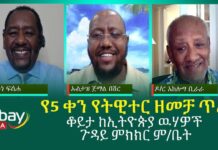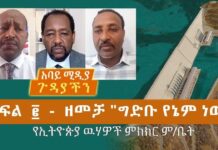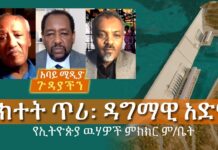Ethiopian Waters Advisory Council (EWAC)
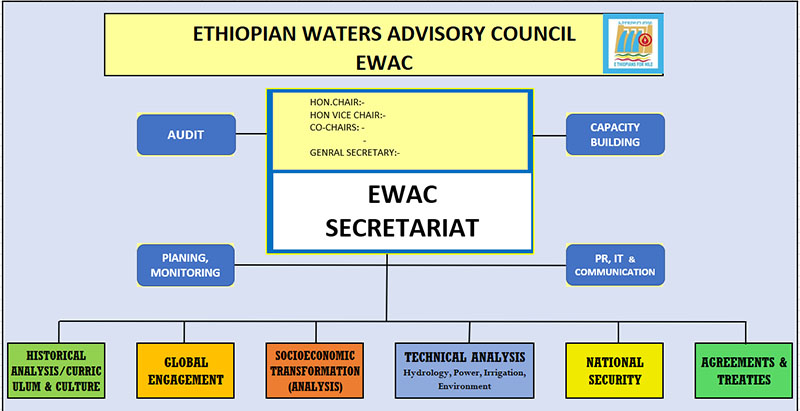
Overview
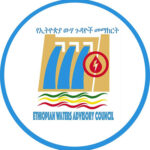 The concerned group of Ethiopian professionals and activists has made significant strides since its inception. It has empowered itself considerably after the announcement of the one-sided and pro-Egypt statement by the U.S Department of Treasury as well as the World Bank on the filling, monitoring, management and use of the Nile; and the implementation modalities of the GERD. The unprecedented statement of the Treasury Department and the acquiescence of the World Bank undermines Ethiopia’s sovereignty severely; and diminishes its capacity to modernize. This unacceptable condition enraged all Ethiopians and friends of Ethiopia; and emboldened them to act.
The concerned group of Ethiopian professionals and activists has made significant strides since its inception. It has empowered itself considerably after the announcement of the one-sided and pro-Egypt statement by the U.S Department of Treasury as well as the World Bank on the filling, monitoring, management and use of the Nile; and the implementation modalities of the GERD. The unprecedented statement of the Treasury Department and the acquiescence of the World Bank undermines Ethiopia’s sovereignty severely; and diminishes its capacity to modernize. This unacceptable condition enraged all Ethiopians and friends of Ethiopia; and emboldened them to act.
The unfair, unjust and lopsided position of the U.S. Treasury and the World Bank on the implementation and management of the Grand Ethiopian Renaissance Dam (GERD) has mobilized the Ethiopian public; and energized concerned Ethiopian professionals, activists and Ethiopia’s friends.
Ethiopians with diverse skills, professions and backgrounds are in the process of pulling their expertise together in defense and support of Ethiopia’s sovereign and legitimate rights to harness water resources within its own territories for the betterment of its growing population. Thousands of Ethiopians including members of Ethiopians for Abbay (the Nile) signed petitions with the sole intent of drawing the attention of the global community of the unfairness of the Agreement on the GERD that favors Egypt and puts undue pressure on Ethiopia.
A protest letter signed by 148 concerned Ethiopians was hand delivered to the President of the World Bank, Sub-Saharan Executive Directors of the Board, the U.S. Executive Director and through her office, the U.S. Secretary of the Treasury, World Bank Corporate Vice Presidents, the Chairperson of the World Bank Inspection Panel as well as Prime Minister Dr. Abiy Ahmed and Ethiopia’s Ambassador to the U.S., Dr. Fitsum Arega.
We are pleased to record that the Inspection Panel responded and met with us electronically. In this session attended by four members of the Panel on the Bank’s side; and Dr. Aklilu Habte, Dr. Semu Moges and Dr. Aklog Birara on our side, our team underscored the need for the World Bank to play a bridging rather than a political role. The team emphasized the reputational and moral risks the World Bank faces not only in Ethiopia but also throughout Black Africa. The team recognized the valuable contributions of the World Bank in its capacity sponsoring, financing and serving as a hub for the Nile Basin Initiative (NBI), an initiative that we believe should be resurrected and supported by the World Bank and U.N. specialized agencies.
Ethiopians for Abbay (the Nile) have played a constructive role in defending Ethiopia’s legitimate rights to complete the GERD on time; and, further, to utilize its water resources. In the light of this commitment, the group believes that our impact will be far greater if we focus on the larger and common goal of serving Ethiopia and its diverse population through a robust and collaborate approach rather than individually and in silos.
Egypt has succeeded in establishing its hegemony over the Nile, largely because it is able to dominate the narrative. From children in kindergarten to top Egyptian leaders, Egyptians speak with one voice. Regardless of the facts on the ground, their collective narrative is that Egypt is entitled to its colonial and exclusionary “natural and historical rights” over the Nile.
Accordingly, we feel that it is about time for Ethiopians and other Black Africans who share Nile waters to change this false and outdated narrative.
Purpose
The Secretariat of Ethiopians for Abbay/the Nile plans to invite anyone and everyone to join this nonpartisan and apolitical community that is bound by a common national purpose; and contribute by joining self-governing and independent thematic work or task groups whose broad parameters will be discussed in greater detail below.
The purpose of the thematic groups is to use state of the art analytical tools and methodologies; and to produce evidence-based and historically irrefutable materials in order to raise systematic and sustained global awareness; to educate Ethiopian society, especially school children; to remind all Ethiopians and friends of Ethiopia concerning the Abbay River or the Blue Nile and other Ethiopian tributaries that feed Nile waters; and to offer high quality policy papers to Ethiopian learning institutions, the public and government officials.
Ethiopians for Abbay/the Nile plan to utilize evidence-based analytical reports and social media tools in promoting and defending Ethiopia’s sovereign rights over its water resources, including the GERD; and to debunk and or diffuse Egyptian propaganda, saber-rattling; and subversions.
Ethiopians for Abbay/the Nile believe that the issue of the Nile should be Africanized. In this regard, we believe that the Nile Basin Initiative (NBI) in general; and, the Cooperative Framework Agreement (CFA) in particular, that outlines the principles, rights and obligations for cooperative management and development of the Nile Basin water resources should be resurrected as soon as possible.
Recent consultations between Ethiopia and riparian countries in Sub-Saharan Africa, most notably the Presidents of Kenya, Uganda and Rwanda offer a window of opportunity to Africanize the Nile. Ethiopians for Abbay/the Nile can and should reach out to other Black African academics, experts, activists, media and institutions of higher learning as part of their global engagement program.
Mutual learning, exchange of information, evidence and policy papers among Black Africans from riparian countries will yield enormous benefits for Ethiopia and other African nations.
The Secretariat of Ethiopians for Abbay/the Nile proposes that we restrict ourselves to a non-judgmental, non-partisan, non-ideological and non-political role advisory role. Our products and services will go a long way in raising global awareness among bilateral and multilateral agencies such as the United Nations system, the European Union, the African Union, foundations, academic and research institutions and civil society organizations across the globe.
Another dimension of our collective endeavor should highlight to Egyptian society and the Arab world that contrary to Egyptian ultranationalist propaganda, Ethiopia and Ethiopians have no intention to harm Egypt and its people. The way out is not war; but negotiation and consultation that serves all riparian nations.
In this regard, the Secretariat recognizes the urgency and gravity of the situation with regard to the current and stalled negotiations on the use of the Nile within Ethiopia’s boundaries; and on the pace of filing, monitoring and management of the GERD financed entirely by Ethiopians.
The Secretariat urges members and thematic groups to work collaboratively and tirelessly and debunk Egyptian claims over Nile waters in general; and in particular, dismiss the defunct ‘Wuchalle’ like treaty of the 21st century that is proposed and is being imposed on Ethiopia by the U.S Department of Treasury and the World Bank. Neither of these bodies has a legitimate role on the matter.
Beyond the completion of the GERD that Ethiopia plans to begin filling this coming winter season, the Secretariat believes that it is imperative for us to defend the sovereignty of Ethiopia over its territorial waters; and protect our country’s right not only to complete the GERD; but also to harness all of its waters for development irrespective of who governs Ethiopia.
This grand objective requires that all Ethiopians need to come together in unison in defense of their country and its rights to use its resources to alleviate poverty and improve the livelihoods of the population; to boost industrialization; and to generate employment.
Throughout their long and distinguished history, Ethiopians have sacrificed their lives, defended Ethiopia’s independence and preserved its territorial integrity so that succeeding generations would enjoy a better life. The construction and completion of the GERD is a major part of Ethiopia’s ambition to create a prosperous and modern society.
The Secretariat and its members recognize that Ethiopians are far behind in their response to the current crisis. However, they are highly motivated and stand together beyond ethnicity, religion, social status and political tendency.
Overarching themes for thematic groups
The Secretariat recognizes that the challenges ahead are formidable. Among these challenges is the fact that successive Ethiopian governments had failed to place ample emphasis in educating generations of Ethiopians on the Abbay/the Blue Nile River; and in underpinning its huge potential for the development of the country as a whole. It is not enough to call Ethiopia a “water tower.” The concept must be translated into programs and projects that change lives on the ground.
There is a critical gap that the education and history thematic group would have to work diligently and methodically to fill. Among the products is a meaningful curriculum for all Ethiopians students from kindergarten to higher education and strengthen a common narrative.
We also need to focus on the education and awareness of the global community that is blinded and misguided by Egyptian diplomacy. In this regard, the global engagement thematic group is encouraged to initiate and launch a multiyear global engagement program using modern media tools, campaigns and learning materials emphasizing Ethiopia’s legitimate rights to use its water resources for the betterment of its 115 million citizens.
The Secretariat believes that in addition to the Africanization of the Nile River proposed above, it behooves us to discredit the venomous, fake and destructive misinformation campaign and propaganda by Egypt, the Arab League and by some well-financed non-governmental environmental groups, including International Rivers. It is time that the thematic group also explores an Ethiopian talent pool dedicated to lobbying efforts to counter Egypt’s systematic falsification program.
Egypt’s relentless global campaign against Ethiopia is a national security threat for Ethiopia. It must be repulsed systematically and wisely using fact-based analysis. Egypt’s propaganda and subversive activities undermine peace, stability and democracy not only in the Horn of Africa; but in the entire Sub-Sharan Africa. Accordingly, the global engagement and sovereignty thematic groups are encouraged to work collaboratively and synergistically.
The Secretariat proposes that each of the thematic groups meet together with their team members; elect or choose their chairs; define their terms of reference; agree on a calendar; and produce their papers for dissemination and archiving by the Secretariat.
How we plan to execute our common agenda
Ethiopians for Abbay/the Nile plans to follow a simple, flexible and synergistic structure as shown in the attached organizational chart; and as discussed below:
I) The Secretariat
-
- Consisting of between 13 to 15 members, the Secretariat provides facilitation services to Ethiopians for Abbay/the Nile (EFA)
- In the above capacity and role, the Secretariat will consist of Planning, Monitoring and Evaluation, Audit, Capacity Building including finance, PR/IT and Media or Communication
-
- A) Capacity Building Team
-
-
-
- The capacity building team shall devise strategies and solicits financial and other resources support from Ethiopians, friends of Ethiopia and others in order to document and disseminate evidence-based findings of the thematic working groups
- Promotes partnerships with Ethiopian and other entities, including foundations, philanthropies and philanthropists
- Encourages and ensures participation of all concerned professionals without imposing undue burdens
- Designs and recommends strategies and operational modalities to strengthen collaboration among thematic groups to support each of the thematic working groups
-
-
-
- b) Facilitators
-
-
-
- Ensure and verify that participation in the group is based on individual expertise and commitment and not on organizational or ethnic or other representation
- Guide and advise the entire EFA community to steer clear of divisive Ethiopian politics; and maintain collaboration and solidarity on a common cause in support of Ethiopia and all of the Ethiopian people
- Respond to queries from thematic working groups and encourage these groups to generate fact or evidence-based analysis and assessment in their respective groups
- Coordinate the activities of the thematic working groups and harmonize mutual support and collaboration
- Represent the concerned professionals in relevant meetings, conferences, press briefings, courtesy visits, high level meetings, etc.
- Report periodically to the concerned professionals on the operations and activities and challenges of EFA
- Organize and facilitate periodic follow-up and review meetings
-
-
-
- c) PR/IT/WEB/Communication
-
-
-
- Prepare and disseminate appropriate press releases, including audio and video
- Follow up and support each of the thematic working groups in generating evidence-based resource materials
- Manage and exercise oversight on the collection, storage and dissemination of the evidence based-resources, materials and information
- Ensure that relevant writings and documents are archived on time and properly
- Proactively and systematically monitor disinformation from Egypt from web sites, media, communications and engage Arabic speaking Ethiopian journalists, Bloggers and activists for such monitoring and responses in Arabic
- Prepare factual rebuttal and dispel misinformation; and disseminate rebuttals strategically and widely, especially to Egypt and the rest of the Arab world
- Encourage Ethiopian tech and media savvy youth to prepare messages, including videos for transmission via social media geared towards specific audiences, for example, Egyptian society, Sub-Saharan Africa riparian institutions, youth and media, businesses, civil society organizations, the donor community, the UN system, the AU, bilateral and multilateral agencies in Ethiopia and in targeted Black African riparian countries
- Provide technical support including IT to Thematic Working Groups on an ongoing basis
- Design and deploy operational modalities to enhance the activities of Thematic Working Groups
- Develop and manage EFA web site, updating it constantly and making it user friendly
- Partner with the Global Engagement Thematic Working Group in the preparation of a strategic and sustainable media and advocacy agenda
- Organize interviews, panels, conferences, pod casts, etc. in support of the Thematic Working Groups, the Secretariat and our overall advocacy and outreach efforts
- Prepare fact-based, attractive and meaningful brochures and newsletters that buffet our global engagement and advocacy work
-
-
-
- d) Planning, Monitoring and Evaluation
-
-
-
- Design and propose a plan of action prioritizing themes, including a calendar
- Identify and propose to the Secretariat and the Thematic Working Groups the criteria used in identifying priorities; and ensure that proper amendments and adjustments are made
- State upfront to Thematic Working Groups what and how monitoring and evaluation will be conducted; and who will conduct the monitoring and evaluation
- Conduct regular monitoring and periodic evaluation and keep records
-
-
II) Thematic Working Groups and Their Broad Roles are Proposed Below:
On the basis of EFA’s commitment and program of action, the activities and operations of the Secretariat and the thematic working groups refer exclusively to Abbay/ Blue Nile and other rivers within Ethiopia’s boundaries.
1) Historical Analysis/Curriculum Development
-
-
-
- Focus on the education and awareness of the Ethiopian public with regard to Abbay/the Blue Nile and other Ethiopian rivers
- Design and recommend an integrated curriculum and a set of teaching materials on Abbay and other rivers for kindergarten and higher education that Ethiopian authorities will be encouraged to utilize deploying indigenous languages
- Assemble, sort out, edit, consolidate and prepare the assortment of papers and commentaries on the GERD from the web and other sources in the form of brochures and other documents for use by Ethiopian academic institutions
- Outline in the form of brochures historical events pertaining to the Nile
- Uncover archeological artifacts pertaining to the Nile and other water basins
- As part of the recommended curriculum, describe civilizations around the Nile starting from pre historic times
- Depict and illustrate in the curriculum for children stories and legends outlined in the holy scriptures
- Identify in the curriculum conflicts in which Ethiopia was involved to defend its rights on the Nile over the last several decades
- Promote studies and works of art highlighting Ethiopia’s rights over its territorial waters
- Utilize works of art as promoters of patriotism and national unity
- Utilize works of art to educate Ethiopians and the world on existing international agreement, treaties, conventions and laws pertaining to cross border rivers in partnership with the National Sovereignty, Agreements and Treaties assessments thematic working groups
- Discuss and document Ethiopia’s historical and legitimate claim, tax collection and other privileges that are acknowledged by third parties, for example, the Ottoman Empire
-
-
2) Global Engagement
-
-
-
- Design and prepare a robust media and advocacy strategy utilizing all the evidence-based resources generated by Thematic Working Groups
- Integrate fragmented efforts with regard to Ethiopia’s rights concerning the use of its water resources including Abbay/Nile
- Focus on global awareness and education of critical communities across the globe, especially UN specialized agencies, major donors to Ethiopia, the European Union, the African Union, legislative bodies, foundations, multilateral donor institutions, Sub-Saharan academic institutions and the media
- State clearly and succinctly using factual evidence and in writing that Ethiopia does not and will not allow a repeat of the 1929 and 1959 Agreements and colonial treaties on the Nile.
- Underscore in writing that successive Ethiopian governments consider Nile Agreements and Treaties null and void. Ethiopia has rejected them as unjust, unfair and inconsistent with international norms and Agreements that govern transboundary waterways. Instead of asserting clonally imposed and dictated Agreements and Treaties on the Nile, Egypt must be compelled to join all riparian countries within the spirit of the Nile Basin Initiative (NBI).
- Be bold enough and change the narrative on the Nile dismissing Egypt’s hegemonic colonial mental attitude; and, instead offering a forward looking and 21st century and Afro-centric alternative.
-
-
3) Socioeconomic Transformation/Analysis
-
-
-
- Focus on analytical framework and policy papers concerning economic, social and financial benefits that accrue from investments in the GERD and in other dams within Ethiopia’s territorial boundaries
- Recommend talking points for laypersons involved in defending and advocating
- Outline and discuss the economic potentials of the Nile and its tributaries and project revenues when the river is utilized properly; and, if the GERD is postponed, analyze and present the potential and real costs of delaying the filling of the dam for Ethiopia
- Estimate the costs and benefits or revenue stream from developing the Nile and its tributaries
- Estimate the cost of completing the GERD and prepare and disclose projection to the Secretariat
- Provide an overview and reasonable estimate of the socio-economic value of the Nile to downstream countries, comparing these benefits to upstream countries
- Weigh in using analytical tools and arrive at a general picture and estimate economic and social benefits forgone or lost as a consequence of the incapacitation imposed by Egypt, the donor community and others on Ethiopia
- Generate ideas, strategies and options on poverty alleviation and food security for Ethiopia
-
-
4) Technical Analysis—hydrology, irrigation, environment
-
-
-
- Provide technical analysis concerning the potential opportunities and hurdles Ethiopia faces in harnessing and utilizing Nile waters, the number of current and future dams for instance, that could be built based on previous studies
- Conduct technical analysis and estimate the amount of hydro power that could be harnessed from the dams; and the foreign exchange earnings Ethiopia might receive
- Conduct an assessment of the amount of land that could be irrigated by Abbay/ Nile waters
- Analyze and make an estimate of the benefits that would accrue from dams, fisheries, flood protection, ground water, the environment and transport
- Carryout and or conduct environmental assessments or impacts on of mega dams on indigenous people and on the environment
- Analyze and offer policy options concerning optimal utilization of the Nile, water conservation and usage
- Discuss in simple language the impacts of GERD and usage of the river Nile on the environment; and offer solutions
- Identify mitigating technologies and propose solutions concerning drought, deforestation, soil erosion, desertification, changes in farming cultures and practices
- Identify and propose water use and low-cost conservation technologies that advance sustainability for Ethiopia and other countries in the Horn of Africa
- Analyze and propose solutions to mitigate global warming and the potential effects of large dams on the environment and society
- Explore best practices across the globe concerning the value-added of moving from rain-fed agriculture to commercial, irrigated and intensive farming for Ethiopia and the Horn of Africa
-
-
5) National Security, Agreements, Treaties (assessments)
-
-
-
- Provide a well-researched and reasoned set of arguments showing the linkages between Ethiopia’s legitimate rights to harness its water resources for the benefit of its growing population, its national security and sovereignty
- Analyze military capabilities of the Horn, North Africa and the rest; and identify Ethiopia’s capabilities to defend itself
- Identify the core and systemic origins of proxy wars against Ethiopia and propose optimal solutions; and link options to global threats including the fight against terrorism
- Diagnose rivalries to dominate the Red Sea and the coordinated push to establish beach heads in the Horn and Ethiopia’s lack of access to its traditional sea ports; and propose a menu of solutions to redress this huge and intractable problem
- Discuss and identify gaps in Ethiopia’s intelligence networks in the region with a view of enhancing its capabilities
- Analyze Ethiopia’s historical and strategic relations with the USA, Israel, Russia and others and identify future scenarios with a view of positioning Ethiopia’s place
- Define and propose national defense, security and intelligence capabilities and strategies, including Artificial Intelligence (AI) and cyber defense mechanisms that will ensure Ethiopia’s sovereignty, territorial integrity and the defense of its infrastructure including the GERD
- Provide overview concerning Agreements, Treaties and international laws that pertain to transboundary rivers
- Identify specific Nile and other transboundary river treaties and agreements that Ethiopia has signed and to which it is committed
- Pinpoint and summarize agreements and or statutes, including the Tripartite Declaration of Principles that Egypt claims are binding on Ethiopia; and use findings to present Ethiopia’s position to the global community
- Review Nile Basin Initiative (NBI) documents and extract principles that benefit Ethiopia and other Black African riparian nations; and propose resurrection of this model for future negotiations
- Provide substantive and substantial inputs to the Global Engagement thematic working groups on the roles of and relevance of IGAD, Black African riparian countries, the AU, the European Union, the G-7 countries, Russia, China, the Middle East, the Arab League, the Congress of the U.S.A., the U.S. Departments of the Treasury and State
- Assess and provide guide on the bridging roles of the U.N. system and multilateral organizations including the World Bank; and the funding and investment potentials of foundations and philanthropic organizations can play
- Design and recommend to the Secretariat and to the Global Engagement thematic working group how best Ethiopia’s diplomats can and should present the country’s position in a strategic and smart manner
- Design and recommend a menu of strategies, tactics and written proposals that Ethiopian negotiating teams can use
- Identify best practices from other countries and present doable options for Ethiopia to negotiate tax payments by Nile waters beneficiary countries, Egypt and Sudan that utilize Ethiopia’s waters freely
-
-
Finally, please note the attached matrix that shows the proposed organizational structure of EFA/the Nile and proposed membership for each Thematic Working Group. Consider this to be a living document that will be adjusted according to changing needs; and that will be populated with new members as they show personal and individual interest to serve the common cause of Ethiopia and the Ethiopian people.
4/5/2020


